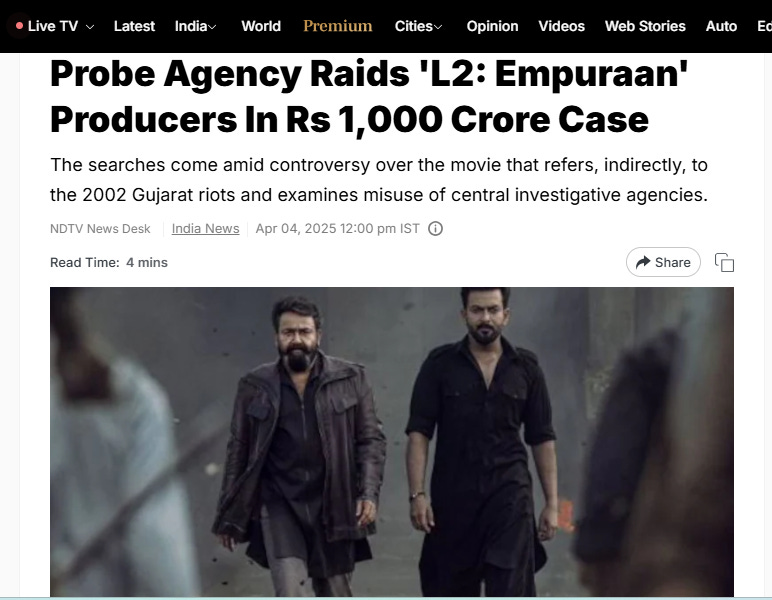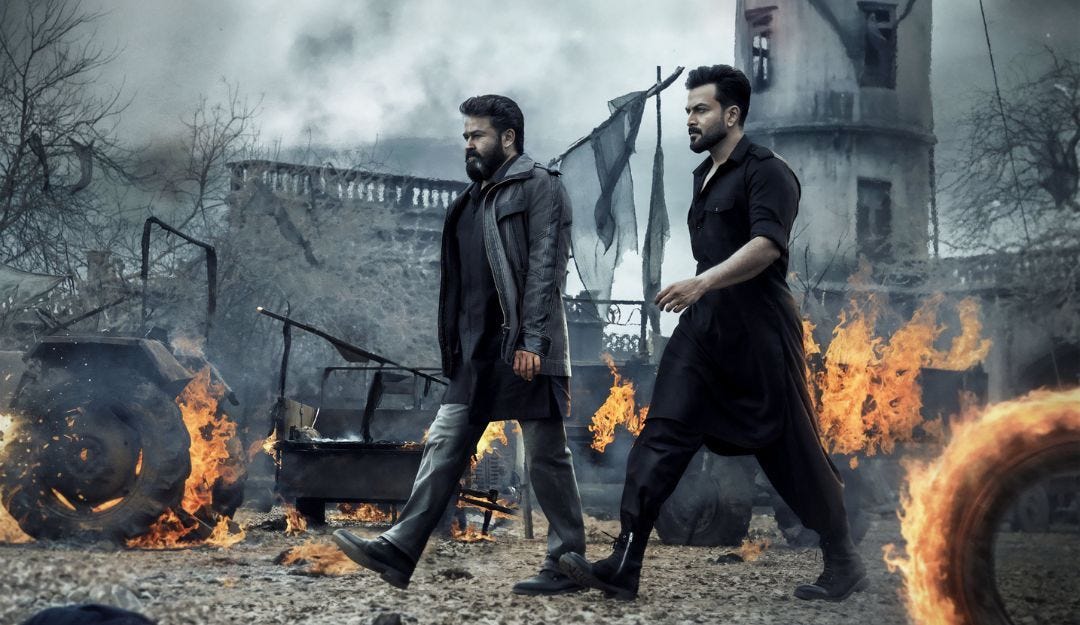Sign up to have posts delivered directly in your email inbox. Much of the content will be free, and there will also be weekly posts for paying subscribers only. I will be reporting from India and the neighbouring countries on stories the world needs to hear. I will interview journalists, writers and public intellectuals known globally for their profound expressions of discontent. There will also be ongoing discussions and debates with experts, policy makers, leaders and creative professionals, on current affairs, crises and humanitarian concerns. An Indian Film, Empuraan, Rattles the Political Establishment: Why This Film Matters for the Future of Indian CinemaAmidst backlash and political controversy, Empuraan boldly challenges India's political climate, confronting uncomfortable truths and redefining the role of cinema in an era of increasing censorshipThe Indian film Empuraan has been making waves, drawing attention for both its ambitious storytelling and the controversy surrounding its political narrative. Released two weeks ago in Malayalam, and subsequently dubbed in Hindi for a national audience, the film stars some of the most prominent names in the Malayalam film industry. Empuraan is a highly anticipated sequel to Lucifer, a 2019 film that was a massive commercial success and marked the directorial debut of Malayalam superstar Prithviraj Sukumaran. Lucifer was widely celebrated for its compelling narrative and larger-than-life portrayal of power dynamics within the political sphere, sparking praise and criticism in equal measures. In a country where critics and filmmakers have raised alarms about the increasing prevalence of propaganda films, which are often seen as amplifying the agenda of the current Modi government and fostering divisive, anti-Muslim rhetoric, Empuraan stands out for its brave choice of theme and using a chapter of history that is being drowned in amnesia, the 2002 anti-Muslim riots when Prime Minister Modi was the Chief minister of the state. The film does not use the word Gujarat but just before the riots one can see images of headlines from the burning of the Sabarmati express that killed 59 people. The main antagonist in the film is called Baba Bajrangi loosely attributed to one of the most popular faces during the Gujarat riots Babu Bajrangi. While the film might not fit the mold of a conventional "cinematic delight," with its stylistic choices and action-heavy narrative, it becomes noteworthy for its subtext and the courage of its creators. In an environment where mainstream media has largely capitulated to the influence of the Modi administration—where even the act of dissent can lead to charges of sedition—Empuraan takes a significant risk in its portrayal of power, resistance, and the fight for justice. More importantly it serves as a distinct memory in the age of amnesia What makes Empuraan even more significant is that its bold narrative and subversive themes are not coming from an indie, low-budget production house, but from a major commercial film. The film is helmed by one of the most iconic actors in Malayalam cinema, Mohanlal, who is considered a cultural and cinematic legend. The film also benefits from the contributions of top-tier professionals in the industry, with a strong lineup of writers, directors, and actors—all of whom have extensive experience in delivering both commercially successful and socially impactful films. This makes Empuraan not just an action-packed sequel, but a cultural touchstone, an example of how mainstream cinema can play a role in questioning societal and political structures, even in an era where the stakes are higher than ever. However, the version of Empuraan that I watched in theaters on April 3rd was not the original film that had been released two weeks prior. What I saw was a version that had been edited to appease India’s censor board, following backlash from right-wing groups who were offended by the film's content. This controversy made headlines for all the wrong reasons, with news channels labeling the film as "propaganda." Prithviraj Sukumaran and MohanLal in Empuraan Ironically, these very same news channels have been vocal in promoting and celebrating propaganda films that have fueled communal tensions across the country. Some critics even went so far as to call Empuraan a "leftist rag." The film, much like its prequel, takes subtle jabs at left-wing politics in India, yet the real reason the establishment and its supporters took offense is far more serious. The film makes a reference purportedly to the 2002 Gujarat riots—an event that has long been a politically sensitive and untouchable subject in Indian cinema. The “G-word,” as it is often referred to, has become a taboo, unless filmmakers are willing to distort the truth for the sake of creating films that downplay or subvert the horrors of the riots. Two such films have been made and celebrated, with explicit endorsements from the state. But Empuraan does what many thought was unthinkable in the 11th year of Narendra Modi’s regime, or in what some call the "New India." The film bravely chooses to address the tragic events of the Gujarat riots, specifically (alleged) referencing the rape of a pregnant Bilkis Bano and the brutal murder of her family. Bilkis Bano, a survivor of the genocide, went on to become the face of the Gujarat riots and has become a symbol of the tragedy. In the film, a Muslim family takes shelter in the home of a generous and secular Hindu woman, only to be butchered by Baba Balraj (a name change dictated by the censor board, as the original character was named Bajrangi). The woman who gives refuge to the Muslim family asks the patriarch to tell his children that this not a communal riot, but a power hungry politician fanning communal tensions to grab power. One of the survivors of this massacre, Zayed Masud—played by Empuraan director Prithviraj Sukumaran—emerges as one of the film's main protagonists. Zayed becomes a loyal lieutenant to Lucifer (aka Abram Khureshi), the "prodigal son" of a prominent leftist politician. This character dynamic also serves as a subtle nod to the film’s critique of the country's political class—both left and right—who have failed to address the very real, ongoing social and political crisis in the country. But it’s not just the historical references that make Empuraan politically charged. The film takes its critique further by directly mirroring the present-day political reality in India. The female protagonist, Priyadarshani Ramdas, portrayed as a fearless leader in her own right, challenges her brother, the Chief Minister (played by Tovino Thomas), who has compromised his integrity by aligning with right-wing factions to shield himself from corruption charges. In response to her defiance, Priyadarshani faces fabricated charges of money laundering (PMLA). The moment when the audience erupts in applause and laughter is telling—it’s a moment of catharsis, a moment where the audience recognizes the film’s biting commentary on the government’s use of power to silence critics and opposition. This is where Empuraan makes its boldest move. The film doesn't just offer a fictionalized portrayal of political violence; it draws direct parallels to the very real tactics that the Indian government has been accused of using to suppress dissent. The Enforcement Directorate (ED) and the Income Tax Department, agencies that are supposed to uphold the rule of law, have allegedly been weaponized by the Modi administration to target opposition leaders, activists, and critics. It's a reality that’s been extensively documented in news editorials and exposes, but Empuraan brings this to the forefront in a fictional setting, mirroring the political climate with chilling accuracy. In a dramatic twist, shortly after the film's release, one of its producers received a notice from the Enforcement Directorate, while Prithviraj Sukumaran himself was slapped with an Income Tax notice. Mohanlal, the film’s star and a veteran actor known for playing indomitable characters who would never bow to authority, was forced to issue an emotional apology on Facebook. This sequence of events makes it clear: Empuraan is not just a film. It's an act of defiance. So, why am I writing this piece for my Substack? Was Empuraan a cinematic work so powerful that it compelled me to write about it? Not really. In many ways, Empuraan is a classic Bollywood blockbuster—it’s larger-than-life, with over-the-top characters and action sequences designed to thrill audiences. It's not the pinnacle of cinematic excellence, and its choreography is nothing groundbreaking. However, what truly makes Empuraan stand out is its spine—the courage it takes to make a film in a climate where mainstream filmmakers are often bending over backwards to appease the government, to whitewash history, criminalize activism, and demonize Muslims as a radical "other." In a time when Indian cinema has largely failed to challenge the political status quo, Empuraan dares to speak truth to power. It does so in a highly stylized, commercial format that may not be everyone's idea of "artistic" cinema, but it is exactly this combination of mass appeal and sharp political critique that makes it revolutionary. In an era where the state has increasingly shown its ability to silence dissent through legal and political means, Empuraan takes a significant risk in doing what few in Bollywood are willing to: it dares to expose uncomfortable truths. For that, it deserves recognition—not as a masterpiece of cinema, but as a bold, necessary act of resistance. One must laud the courage of filmstar Prithviraj Sukumaran who has handled similar themes against bigotry and state sponsored hate in his earlier film, Jana Gana Man. This film is an act of defiant memory in the chilling Orwellian era of amnesia in Modi's India and for this very reason, it must be celebrated. In a landscape where the voices of dissent are increasingly silenced through legal, political, and social pressures, Empuraan boldly challenges the status quo. Its unapologetic portrayal of the Gujarat riots, the use of state agencies for political retribution, and the critique of both left and right-wing politics is an act of defiance—a cinematic rebellion against the authoritarian tendencies creeping into the fabric of Indian democracy. For that alone, Empuraan deserves recognition, not just as a mass-market blockbuster, but as a vital piece of political cinema. It represents a rare form of resistance in a time when the Indian film industry, by and large, has been too willing to sanitize its narratives for commercial and political convenience. In a world where the line between art and propaganda is increasingly blurred, Empuraan reminds us of the power of storytelling—not only to entertain but to provoke, challenge, and push for change. You're currently a free subscriber to Rana Ayyub's Newsletter. For the full experience, upgrade your subscription. |



